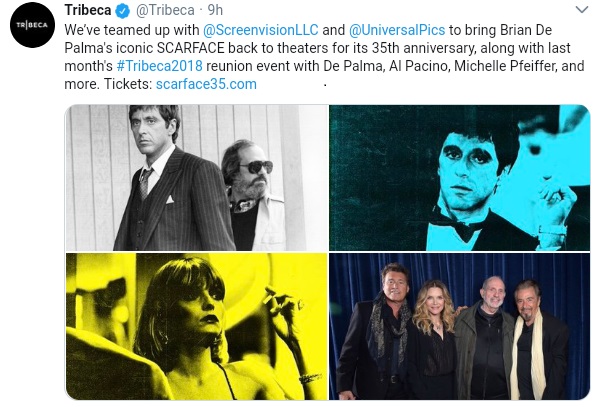Recently, the Tribeca Film Festival celebrated the 35th anniversary of “Scarface” with a screening at the Beacon Theatre, followed by a panel discussion featuring Al Pacino, Brian De Palma, Michelle Pfeiffer and Steven Bauer. I moderated the panel discussion.
There never was an audience for “Scarface” like the 2,894 film fans at the Beacon. Of course they knew all the great quotes, but even more, they cheered like opera buffs after the great scenes. And when it ended, better believe they were eager to be in the same air space as the stars.
I brought the actors onstage one by one. Bauer got some love. Pfeiffer got more. De Palma got a roar. Then, with one chair empty, I teased the audience: “There’s one more… I forget…. Oh, I got it….Al Pacino!” The theatre went nuts. Al basked at the standing ovation. “Still got it!” he said.
And then we began. I started with the person who had the idea to remake the 1932 classic: Al Pacino. I asked Bauer about being the only Cuban in a major role. I asked De Palma about getting around the repeated X-ratings, quoted Chekhov’s remark that a gun on the wall in the first act must be fired in the second and asked if having a chainsaw murder in the first 15 minutes of the film made him question if topping it in the final scene might be too much violence for any audience. And, of course, I prompted Pacino to deliver the most quoted line of his career: “Say hello to my little friend.”
Michelle Pfeiffer has described herself as a “set piece” in this film — the attractive woman who looks good on the arm of the leading man but who’s not essential to the story. And because questions of misogyny and female agency are no longer background noise, I asked her to look back at “Scarface” from the perspective of 2018. She spoke eloquently about what she learned as a very young actress paired with a powerful star giving one of his most aggressive performances: “One of the things that hit me the strongest from the beginning was watching him fiercely protect his character and really at all costs and without any sort of apology. And I have always tried to emulate that. And I try to be polite about it. But I think that’s what really makes great acting.”
Pfeiffer’s crisp, smart responses got little media attention. Only one exchange did. I was curious about her preparation for the role as a cocaine freak whose diet seemed to consist of cigarettes and Scotch. And I thought of my daughter, who is exactly the same height as Pfeiffer. She is thin. In “Scarface,” Pfeiffer was dramatically thinner. So I asked: “As the father of a daughter, I’m concerned with body image. During the preparation for this film, what did you weigh?”
The crowd — not all, but a vocal contingent — reacted instantly. There were boos. Someone shouted, “Bad question.” I also heard “Why do you need to know?” and “Why!”
I turned away from Pfeiffer to speak directly to the audience: “This is not the question you think it is.”
Press reports said that Pfeiffer was dismayed at the question and paused before answering. Not so. She paused because, like a professional, she was waiting for the crowd to settle down. And then she answered my question — at length: “I don’t know. But I was playing a cocaine addict, which was part of the physicality of the part, which you have to consider… The movie was only supposed to be a three-month, four-month shoot. Of course, I tried to time it so that as the movie went on, I became thinner and thinner and more emaciated. The problem was the movie went six months. I was starving by the end of it because the one scene, which was the end of the film, where I needed to be my thinnest, it was ‘next week’ and then it was ‘next week’ and then it was ‘next week.’ I literally had members of the crew bringing me bagels because they were all worried about me and how thin I was getting. I think I was living on tomato soup and Marlboros.”
At the end, the stars got a standing ovation. There was a small after-party. Around midnight, I went home and, as I generally do, logged on. To my surprise there was a YouTube report of my question to Pfeiffer, but because I wasn’t named as the moderator, I laughed and went to bed.
Friday morning I woke up to 20 emails. And to items in the Post and the Daily News and half a dozen other publications. All took me to the woodshed for asking an insensitive, inappropriate question.
By mid-morning, I was asked to comment. I replied:
“It is true that a gentleman should never ask a woman about her weight. But that was not my question. It is a comment on the knee-jerk political correctness of our time that no one would be shocked if you asked Robert De Niro about the weight gain required for his role in ‘Raging Bull’ but you get booed — not by many, but by a vocal few — for asking Michelle Pfeiffer about the physical two-dimensionality required for her to play a cocaine freak in ‘Scarface.’”
Finally, I caught a break: In the Daily News, Linda Stasi wrote a column headlined “Sorry, PC police — it’s not body shaming to ask Michelle Pfeiffer how much she weighed during ‘Scarface.’” Her first sentence: “What a bunch of fat heads!”
Later, I had a chance to add to my response:
Nobody booed when I asked Michelle about how she was able to “own and claim” her performance against one of Al’s fiercest performances.
Nobody booed when I asked Michelle if she could imagine a remake in which Tony Montana was Toni Montana — a woman.
Nobody booed when I asked Brian if he were making this movie now, would Tony be a Russian — or even Mark Zuckerberg?
Nobody booed when I quoted Tony Montana — “Who put this thing together? Me!Who do I trust? Me!” — and asked Al: Who does that sound like?
I’ll go further. Not to defend myself — it’s not possible to defend yourself against the accusations of people who know you better than you know yourself — but to tell you what I learned from this experience.
First, there’s a double standard here. When a man gains or loses weight for a role, that fact is served up to the media as an asset. It’s not just De Niro in “Raging Bull.” Matthew McConaughey lost 50 pounds and Jared Leto shed 40 for “Dallas Buyer’s Club,” Matt Damon lost 40 pounds for “Courage Under Fire” — the reporting of their preparation for roles is invariably admiring. For women, the topic of weight can also be an asset — if she reveals it, as Charlize Theron did when she told Entertainment Weekly about the 50 pounds she gained for her role in a new film. So why is it “insensitive” to ask Michelle Pfeiffer about her physical instrument in a movie she made 35 years ago? Has something happened in the last 35 years to turn a young actress who had the strength to stand up to Al Pacino into a timorous Victorian maiden who needs protection from a man asking a question about her public persona?
Before we went on stage, I quoted Oscar Wilde to Pfeiffer and Pacino: “There are no impertinent questions, only impertinent answers.” Yes, I could have worded that question better. And if the question, in any form, offended Michelle Pfeiffer, I apologize.
More to the point: If I knew the audience was hardcore liberal PC, I would still have asked that question, though I would have asked it another way. But I had no idea there are New York movie lovers who see little difference between a man asking a woman about something she did professionally and Donald Trump bragging about grabbing women between their legs. It’s not heartbreaking, but it’s really, really disappointing to learn that people who presumably deal with complexity and multiple levels of meaning in their careers can be as stupid and close-minded as people who watch Fox and think Pizzagate and Obamaphones are real.





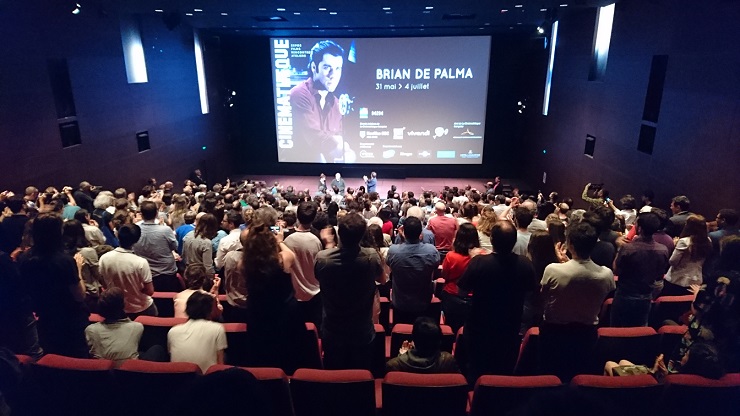
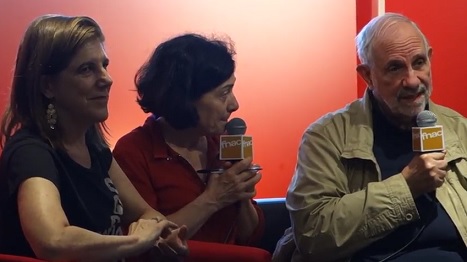
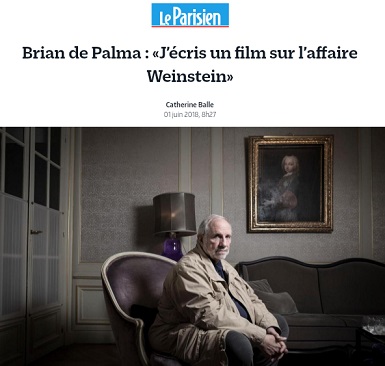
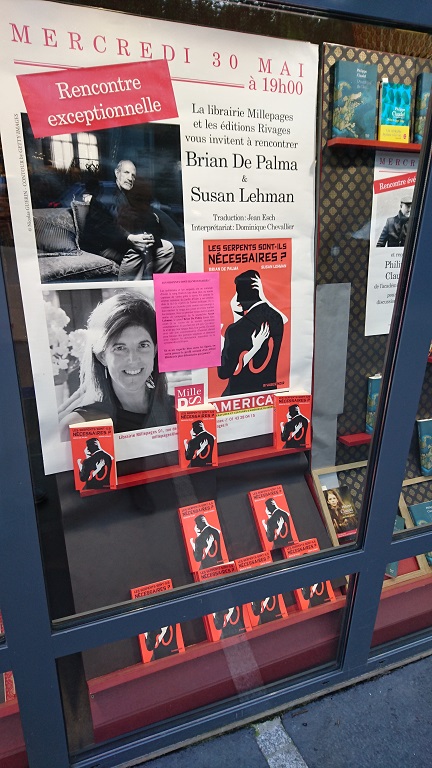 Brian De Palma and Susan Lehman were at Librairie Millepages in Vincennes, an eastern suburb of Paris, yesterday to discuss and sign copies of their novel, Are Snakes Necessary? Christian Grevstad, a regular reader of De Palma a la Mod, caught the tail end of the event and took the picture at the top of this post. Another regular reader, Romain Lehnhoff, was there, and has posted some video captures from the discussion on YouTube. Here are some links-- I will try to transcribe some of these as I get a chance:
Brian De Palma and Susan Lehman were at Librairie Millepages in Vincennes, an eastern suburb of Paris, yesterday to discuss and sign copies of their novel, Are Snakes Necessary? Christian Grevstad, a regular reader of De Palma a la Mod, caught the tail end of the event and took the picture at the top of this post. Another regular reader, Romain Lehnhoff, was there, and has posted some video captures from the discussion on YouTube. Here are some links-- I will try to transcribe some of these as I get a chance:
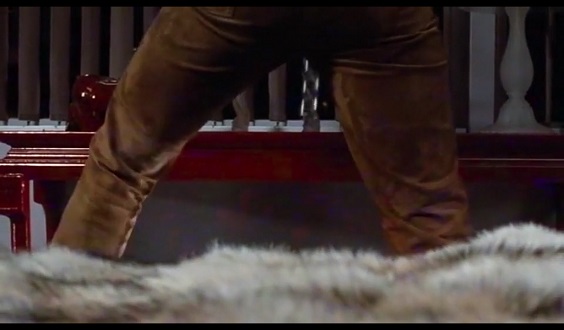
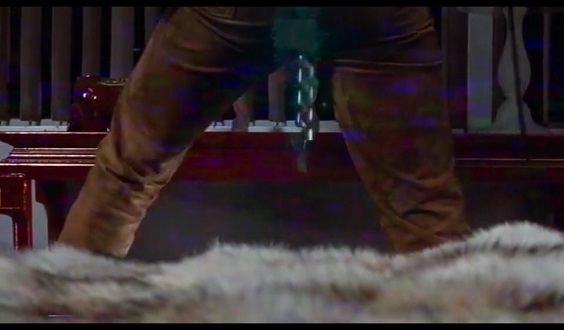
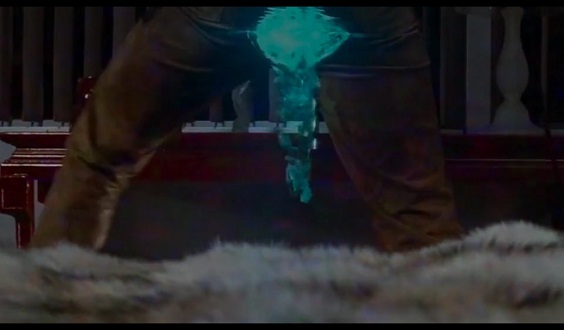
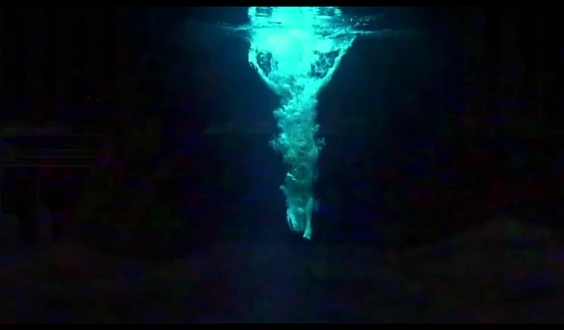

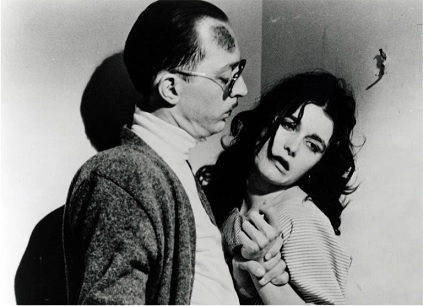 Eight early Brian De Palma films make up a weeklong series at this year's
Eight early Brian De Palma films make up a weeklong series at this year's 
